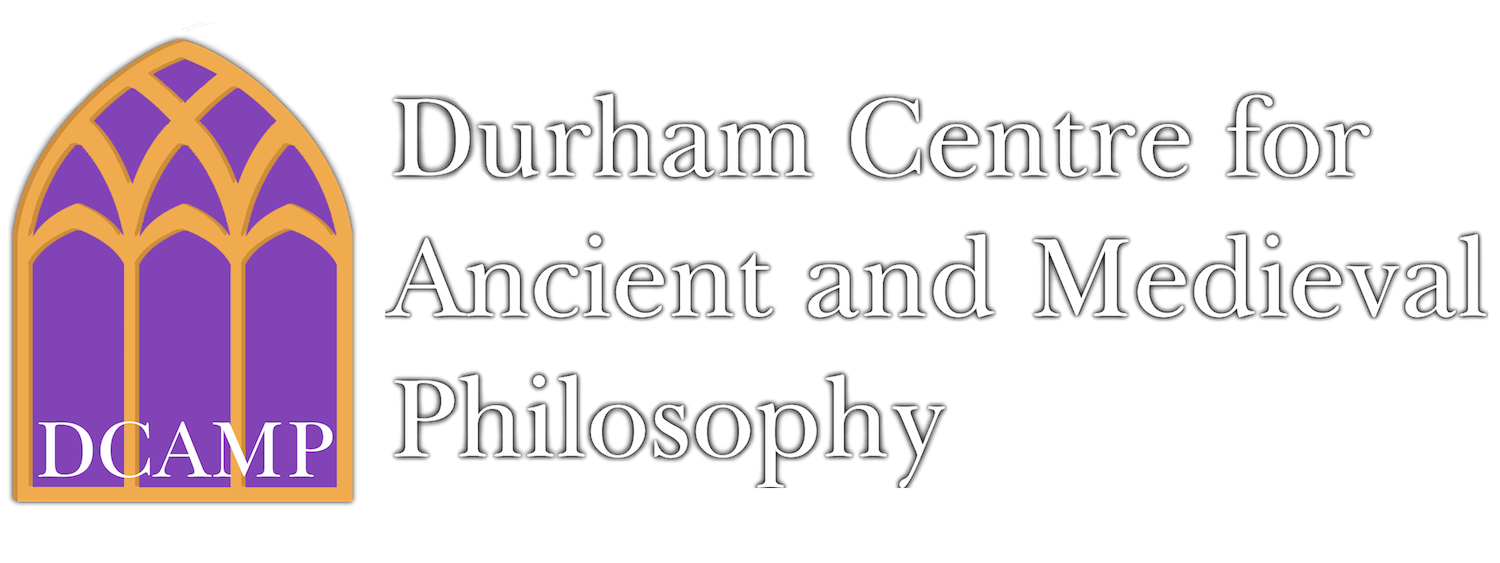By Phillip Sidney Horky1
I. Medieval Durham (7th-14th Centuries)
The origins of the study of philosophy in Durham can be traced to the Venerable Bede (c. 673-735 CE), who spent most of his life in nearby Jarrow, and is now entombed in Durham Cathedral. Amongst his many works on history and ecclesiastical practices, Bede composed a treatise On the Nature of Things, a cosmogonic account that was intended to surpass Isidore of Seville’s work by the same name (it was, of course, a common title of works of physics from ancient philosophy, most notably for the Epicurean Lucretius’ On the Nature of Things).2 There, Bede demonstrates a deep commitment to ideas found in the writings of St Augustine, who successfully bridged the gap between Christianity and pagan philosophy several centuries prior. But Bede also shows inclinations towards the methods of Lucretius, whose great philosophical poem he knew only by proxy, seeking to provide scientific explanations for natural phenomena (like eclipses and thunder). Bede also wrote works on time (On Times, the Reckoning of Time), although these are for the most part repetitions or expansions of Isidore’s Chronicles – with some ingenious etymologies, e.g., of the Latin word ‘moment’ (momentum) from the word for ‘motion’ (motus).3
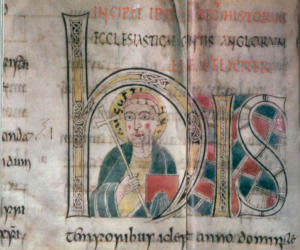
It wasn’t until the 14th century, however, that ancient philosophy began to be studied formally in Durham. The philosophy of the ancient Greeks and Romans was championed by Richard de Bury (1281-1345), Bishop of Durham from 1333, through his philanthropic support of translation and institutional support of book collection.4 In his treatise Philobiblon, compiled near his death, Bury laid out regulations for the compilation and organisation of a library at the recently established Durham College, Oxford (where Trinity College now stands), while at the same time demonstrating his love for ancient philosophy in particular. Bury cites as authorities alongside one another no less than Zoroaster, Enoch, the Egyptians, the Babylonians, Palamedes, Pythagoras, Plato, and Aristotle, whom he considered the master philosopher. Bury sought to establish his own Academy in Durham, surrounding himself with Oxford philosophers who had written on Aristotle, including the mathematician and astronomer John Mauduit and the logician Thomas Bradwardine, who himself later became Archbishop of Canterbury. He is also associated with Richard Kilvington, the ‘grandfather’ of sorts of the Merton (or Oxford) Calculators, a group of people who sought to integrate logic, mathematics, natural philosophy, and were the first (in the west) to prove a number of important theorems of physics (specifically relating to continuity and continuous motion). Finally, Bury expressed a special appreciation for Aristotle’s Metaphysics and Politics, supporting the important philosopher Walter Burley (c. 1275-after 1344) to write a commentary on the latter (along with one on the Nicomachean Ethics, and two treatises On Universals and the Ancient Art) while apparently in residence in Durham, from 1334-1340. The latter two treatises, which focus on metaphysics, remain without a modern edition. Burley was one of the main proponents of realist natural philosophy in an anti-Ockhamist vein, and he became one of the most influential philosophers in the 14th century.
II. From the Founding of the University of Durham until World War II (1832-1939)
When the University of Durham was officially established in 1832, ancient philosophy was a core element of the newly designed educational curriculum. Of the three University Professors, two examined ancient philosophy (the Rev. Canon Henry Jenkyns, Professor of Greek and Classical Literature 1832-1840, and Rev. John Carr, Professor of Mathematics 1832-33, followed by the astronomer Rev. Temple Chevallier, 1833-1871). BA examination papers from 1836 included translation of Xenophon’s Memorabilia from Greek and deductions from Euclid; for the Classical honours degree, students were required to discuss core topics in Aristotle’s logic and ethics, including ‘Explain the nature of abstraction, and mention to which of the three operations of the mind it is to be referred’.5 A year later, the University began issuing MA degrees, and students were tested on Cicero’s On Ends and Aristotle’s Nicomachean Ethics, with questions including ‘What were the respective opinions of the Peripatetics and Stoics on the subject of the sovereign good?’.6 Aristotle’s Rhetoric would routinely appear on MA examination papers over the next several decades.
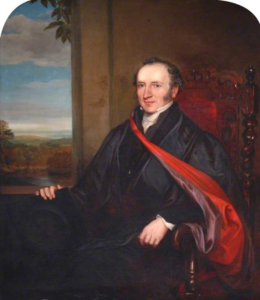
In 1840, Plato was introduced to the undergraduate curriculum, with lectures on the Phaedo. The curriculum would remain much the same under Jenkyns’s successors, the Rev. John Edwards (1841-1861) and the Rev. Thomas Saunders Evans (1862-1887), and the Rev. Herbert Kynaston (1889-1910) with some minor changes. In 1869, Plato’s Philebus appeared on the subjects for examination for Honours in Classical and General Literature, and it was replaced by Republic III-VII a year later; the latter would remain a core text for examination for decades. For example, in the 1887 examination for the Honours degree, a question appearing under ‘Moral Philosophy’ is: ‘“δεῖ δέ που τελευτᾶν τὰ μουσικὰ ἐς τὰ τοῦ καλοῦ ἐρωτικά” (Rep. III). What scope is there for moral enthusiasm in Plato’s system?’7
For the most part, prior to the 1880s, ancient philosophy was taught, rather than rigorously researched and published (by modern standards), by the University’s staff. We witness a change with Frank Byron Jevons (1858-1936). Jevons, a Victorian polymath with interests ranging from the philosophy of science and religion to comparative anthropology and philology was appointed to Master of Bishop Hatfield’s Hall (later Hatfield College) in 1887, where he remained until 1922. Initially, he was not enamoured of philosophy, explaining in his 1886 History of Greek Literature (London) that he only included philosophers such as the Presocratics, Sophists, and Plato, ‘only in so far as they affected the history of Greek literature’ (p. 465). In 1910, Jevons was appointed Vice Chancellor, and the first Professor of Philosophy of the University of Durham. Three years later, he published a comprehensive study of the self in Personality (London), where, among other things, he sought to evaluate the claims of Hume, James, and Bergson concerning personal identity. Yet he did not find such enquiries among the ancient philosophers he had effectively abandoned to his youth. In that same year, Jevons published what would become his most long-lasting work, Comparative Religion, reprinted by Cambridge University Press in 2011. After serving as Pro-Vice Chancellor of the University 1912-1914, and 1916-1921, a period which saw the expansion of the University and its curricula, Jevons retired in 1930.
Mabel Atkinson (later Palmer) (1876-1958) was Assistant Lecturer in Classics and Lecturer in Logic and Philosophy at Armstrong College8, Durham, from 1904-1908. An avid political philosopher, Atkinson published Local Government in Scotland (Edinburgh, 1904) that sought to explain to the average Scotsman the structure and relations of his own government. Here, Atkinson broaches a subject that would turn out to be important for her future, and for that of others: the universal voting rights of women. She argues that universal suffrage should be extended precisely because those women who have enough financial means to support their household, who could in fact vote, are precisely the ones who would benefit least from it.9
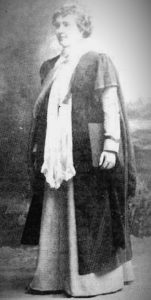
(Photo: Killie Campbell Africana Library)
In moral philosophy, Atkinson published a controversial article10 in which she sought to reconcile Nietzsche’s concept of the ‘superman’ (Übermensch), and its commitment to living a life of strong vitality, with a Christian principle of atruistic ‘extensity of life’, which is to be preferred over Nietzsche’s pessimism. On the issue of economics, Atkinson appealed to Xenophon and Aristotle in making the case that the science of household management had been overlooked since Adam Smith:
If, to the management of our towns – which are, after all, only our homes on a larger scale – were applied the principles used by a good housekeeper in ordering her home, then cleanliness, beauty and convenience would increase around her. A science of economics so modified would recall to a scholar the original meaning of the word; for what, after all, did the craft of οἰκονομική, first developed by Xenophon and Aristotle, mean but just ‘management of the home’?11
From 1908, Harold P. Cooke succeeded Atkinson as Assistant Lecturer in Classics and Lecturer in Philosophy at Armstrong College. His first book, Maurice, the Philosopher (a Dialogue), or Happiness, Love, and the Good (1912), adapted the style of Plato’s Symposium to present a universal account of the Good, but with a glance at Aristotelian ideas of friendship. The conclusion reached by Maurice, the chief interlocutor, is that ‘the Good…consists in the perfect love of persons.’ Following the footsteps of Jevons before him, Cooke ventured into religion and anthropology with his 1931 work Osiris: A Study in Myths, Mysteries, and Religion, and in 1938, he translated Aristotle’s Categories – the first modern translation of that work into English – for the Loeb Classical Library Series.
Raymond T. Norman joined Durham as a Lecturer in Classics in 1925 (he later became Lecturer in Ancient History and Philosophy) and remained in post until 1955. As had been the case for a good half-century, Plato’s Republic remained a standard text on final-year examinations for honours degrees: for the Greek examination, one was required to master Republic IV-VII; but for the Philosophy examination, the focus was rather on Books I-IV, in the context of Butler’s Sermons, Mill’s Utilitarianism, and Kant’s Fundamental Principles of the Metaphysic of Morals.12 Around 1937, when Armstrong College merged with the College of Medicine to become King’s College, Durham University, the ‘Problems in Ancient Philosophy’ course comes to be offered only in alternating years; consequently, the teaching of ancient philosophy, and the appointment of scholars of ancient philosophy to the Classics faculty, gradually shifts over to the Durham campus. Norman himself published little, but one can get a sense of his universal approach to integrating ancient philosophy with the teachings of Christianity from an article on ancient views of immortality published in the Durham University Journal.13 Norman argued that Plato and Speusippus ‘did not consider or did not sufficiently work out…the problems of evil, and of Creation and the reality of the individual’, but they were on the right track when they realized that ‘the One must be Many and the Many One if the problems of philosophy and religion are to have an answer.’14
III. From World War II until the Founding of the University of Newcastle (1939-1963)
In 1939, the first great modern scholar of ancient philosophy in Durham, George B. Kerferd (1915-1998), arrived from Melbourne and Oxford to take up the Lectureship in Classics. Kerferd remained in Durham until 1941, when he resigned due to the disruptions of World War II, and returned to his hometown of Sydney. In 1946, Kerferd returned to Durham and remained there until 1950, when he departed for the University of Manchester, as a Senior Lecturer in Greek and Latin. While in Durham, Kerferd published path-breaking articles in the Durham University Journal that would set the agenda for the study of ancient ethics, and for his own now canonical research on Plato and the Sophists.15
In 1945, J. S. (John Sinclair) Morrison (1913-2000) was appointed Professor of Greek and Classical Literature. In particular, Morrison approached ancient philosophers through the lenses of history and the study of institutions. While at Durham and working alongside Kerferd, Morrison laid the ground work for several influential articles (on ancient philosophical and scientific method, Protagoras, Pythagoras, and Plato’s Statesman)16 that he would compose after his departure for Trinity College, Cambridge, in 1950.
After teaching stints in Cambridge and Manchester, in 1949 J. B. (Joseph Bright) Skemp (1910-1992) was appointed to the Readership in Greek at King’s College, Durham, and to the Professorship of Greek one year later, presenting his inaugural lecture on ‘The Permanent Value of Greek Studies’.17 Skemp had some years before produced a very influential monograph, The Theory of Motion in Plato’s Dialogues (1942), which remains to this day the most complete study of the subject.18 In 1952, Skemp published his celebrated translation of Plato’s Statesman, which was reviewed by Kerferd in the Durham University Journal, who said of it:
At one time the translation of authors for publication tended to be regarded as simply one form of literary activity, when it was not scorned altogether as unworthy of the true scholar. Yet for philosophic writers one of the best forms of commentary has always been translation, and in the last twenty years some of the best work on Plato in this country has found publication in the form of translations with introductions and notes. It is with these that the present work is to be classed, and it is particularly welcome since the Politicus has not been edited in any form in this country since 1867.19
Never mind the fact that Skemp had just taken over as editor of that very same journal! At any rate, Skemp continued to edit the Durham University Journal for another 4 years, but resigned from its editorship in order to co-found (with D.J. Allan of the University of Edinburgh) Phronesis in 1955. Phronesis would go onto become one of the most important journals for ancient philosophy, maintaining a persistent relationship with Durham (C.J. Rowe was Co-Editor of Phronesis from 1997-2003, and George Boys-Stones is currently Managing Editor).
In 1950, G.E.L. (Gwilym Ellis Lane) Owen (1922-1982) arrived as a Research Fellow in Philosophy, after completing his studies with Gilbert Ryle at Corpus Christi College, Oxford. While in Durham, Owen secured his legacy with his very first published article, ‘The Place of the Timaeus in Plato’s Dialogues’, in which he argued contra omnes that the Timaeus was an earlier work of Plato’s, and not a work of mature philosophical expression – a position not shared by many today! In 1953, Owen returned to Oxford, where he took up a Lectureship in Ancient Philosophy. Owen went onto alter the history of ancient philosophy beyond measure, as the first Professor of Ancient Philosophy at Oxford (1963), Professor of Philosophy at Harvard (1966-1973), and then Laurence Professor of Ancient Philosophy at Cambridge (1973-1982).
The 1950s and 1960s were a time of change in Durham. In 1954, the University welcomed K. W. Mills as Lecturer of Classics, where he remained until his death in December of 1977. In particular, Mills brought an interest in Platonic metaphysics, raising philosophical awareness of the famous ‘equal sticks and stones’ passage of Plato’s Phaedo (74b-c) in a now-classic article from 195720 and, in another important article from 1967, implicitly rejecting Owen’s claims about the absence of a sophisticated metaphysical scheme in Plato’s Timaeus.21 In particular, Mills was concerned with the problems of naming and self-predication of Forms. While Mills did not publish extensively, the imagination and rigour evidenced in his Phronesis articles is suggestive of how approaches to Plato’s philosophy were changing with the times in Durham. Viewed from the vantage point of the 21st century, Mills’ work reflects other ‘analytic’ approaches of the day, including the cutting-edge work on metaphysics, language, and logic of Owen, Ackrill, and Michael Frede.
IV. Transition and Expansion (1963-1995)
In 1963, the federal University of Durham was dissolved, and King’s College, which was located in Newcastle, formed its own university. It was at this point that Skemp stepped down as editor of Phronesis in order to channel his impressive administrative abilities into his new position as Dean of the Arts at the University of Durham. A devout Baptist, Skemp published his series of Whitley lectures from 1962 as a work of popular philosophy and biblical history, The Greeks and the Gospels (1964), thus continuing a trend of situating the New Testament in the context of Greek Philosophy that stretches back to the foundations of the University and forward to the work being done in DCAMP presently. The 1960s was an important period for the expansion of education in ancient philosophy in Durham, as it saw the matriculation of two of its most well-known students: Thomas Robinson, who would eventually go onto become Professor of Philosophy at the University of Toronto, and Harold Tarrant, now Professor Emeritus of Classics at the University of Newcastle (Australia), whose PhD thesis Plato’s Five-Fold Classifications in Relation to the Metaphysics of the Middle Platonists (1971), dedicated ‘without permission and yet with all sincerity’ to Skemp remains in the Classics and Ancient History library.
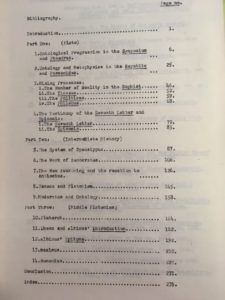
1965 saw the appointment of P.J. (Peter John) Rhodes (1940-; FBA 1987) as Lecturer of Ancient History. Rhodes had completed the BA and PhD degrees at Wadham College, Oxford, where he had written a doctorate on the Athenian Boulê under the supervision of D.M. Lewis.22 Strictly speaking, Rhodes would always consider himself an historian – and never a philosopher – but it goes without saying that his work has influenced the study of ancient philosophy tremendously. Especially prominent has been his A Commentary on the Aristotelian Athenaion Politeia (1981; 2nd ed. 1992), the definitive treatment of the Constitution of the Athenians, a ground-breaking papyrological discovery that has been thought to have been composed by Aristotle. Rhodes was appointed Professor in 1983, and in 2005 he retired. He remains a stalwart presence in Durham, and a committed member of the Senior Common Room at University College, Durham.
In 1974, Skemp retired to Cambridge, where he would go onto write a concise monograph devoted to mapping out the work of the philosopher he loved most, Plato (1976), for the New Surveys in the Classics book series (currently co-edited by Phillip Horky). Writing in that volume, he summed up his own views of Plato thusly: ‘It ought to be clear that in his own right Plato is a seminal thinker whose influence must remain, and who can never be politely banished (as Plato himself wanted to banish Homer) from human consciousness.’23 It was subsequent to Skemp’s retirement that Michael C. Stokes (1933-2012) arrived from Cornell University as Professor of Greek, a title he would hold until his retirement in 1993. Stokes had been a lecturer at the University of Edinburgh (1956-1970) and a fellow at the Center for Hellenic Studies in Washington, D.C., for the years 1963-1964, where he wrote much of what would become his celebrated first book One and Many in Presocratic Philosophy (1971). It was with Stokes that ancient philosophy in Durham witnessed the ‘literary turn’: from then on, Durham scholars would turn their attention to the literary and philosophical aspects of ancient philosophical texts. Naturally, it was in the character and practice of Socrates, as presented in the dialogues of Plato and Xenophon, that Stokes turned for his inspiration. His extensive work on the Socratic dialogues is evidenced by his book Plato’s Socratic Conversations (1986), which was followed up by a student edition of Plato’s Apology (1997) and his book on the Crito, Dialectic in Action (2005). In his collaboration with the Department of Philosophy, Stokes inaugurated a joint honours degree in Greek and Philosophy, showing his deep commitment to the principle that philosophers should learn ancient Greek. Upon his passing in 2012, Stokes’ daughter bequeathed his philosophy books to the Department of Classics and Ancient History, which consequently boasts a most impressive ancient philosophy collection.

In 1978, Anne Sheppard (Professor Emerita of Ancient Philosophy at Royal Holloway, London) was appointed as Lecturer of Classics in Durham, where she would remain for a decade. Sheppard arrived from Oxford, where she had completed a doctorate on literary theory in Proclus, which would fuel much of her subsequent research into Neoplatonism and Aesthetics. While in Durham, she wrote Aesthetics: an Introduction to the Philosophy of Art (1988), an impressively concise and wide-ranging discussion of the philosophical issues involved in understanding both the material and the written arts. Sheppard’s work takes its cue from the principle of art-object as mimêsis in Plato’s Republic and extends it beyond Plato’s text to develop a critique of Kant’s aesthetic theory. Upon Sheppard’s departure, the Department of Classics and Ancient History was joined by both John Moles (1949-2015) and Martin Ferguson Smith (1940-; OBE 2007) in 1987. Both Smith and Moles arrived from the University of Bangor in Wales, in a deal which saw the transfer of the Classics Department there to Durham. An impressive polymath, Moles ranged across many subjects of contingent relevance to ancient philosophy, from Greek Tragedy and Greco-Roman historiography to Early Christianity, but his main contributions to the history of philosophy lie in his important articles on the Cynics.24 Moles remained at Durham until 2001, when he would take up a Chair of Latin at Newcastle University; he passed away quite suddenly in 2015, suffering cardiac arrest while doing research in the Bill Bryson Library at Durham University.
Smith established himself from his early career in Dublin as a specialist in Epicureanism, with special emphasis on the writings and thought of Lucretius, and a translation of the philosophical poem On the Nature of Things originally published in 1969 (rev. edition 2001). But Smith’s greatest passion throughout life has been the famous Epicurean inscription of Diogenes at Oinoanda, in Turkey. This inscription, which dates to the early 2nd Century CE, is the longest surviving continuous epigraphical document from antiquity (over 25,000 words), and it features treatises on ethics, physics, and old age, in addition to epistles (a preferred mode of Epicurean communication). Smith’s textual edition of 1993 (with subsequent supplements) is the most authoritative assessment of Diogenes’ inscription. Smith, who retired as Professor of Classics in 1995 and was made OBE in 2007, is quick to point out that less than one-third of the inscription has been recovered, and he continues to to collaborate in work to find more.
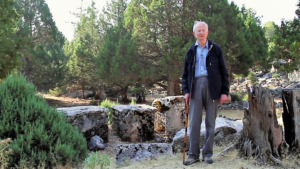
In the early 1990s, Durham had the fortune of hosting two eminent scholars of ancient philosophy at alternate stages of their careers: E.E. Pender (Senior Lecturer of Classics, University of Leeds), took up the post of visiting Lecturer for 1991-1992 right after completing her doctorate in Durham with Michael Stokes; and, on the heels of the publication of his influential translation of Iamblichus’ On the Pythagorean Life (1991, co-edited with John Dillon), Jackson Hershbell (Emeritus Professor of Classics, University of Minnesota) visited Durham for the academic year 1992-1993.
V. Ancient and Medieval Philosophy at Durham in the Modern Era (1995-2017)
Upon Smith’s retirement in 1995, Durham welcomed C.J. (Christopher James) Rowe (1944-; OBE 2009) as Professor of Greek in Durham. After obtaining his doctorate in Classics at Cambridge under the supervision of H.J. Easterling, Rowe took up a position at the University of Bristol, where he taught from 1968. Rowe’s extensive body of research started in the 1970s with work on the development of Aristotle’s ethics, including his first book, a revision of his doctoral thesis, entitled The Eudemian and Nicomachean Ethics: A Study in the Development of Aristotle’s Thought (1971), followed by books on early Greek ethics (1976) and Plato (1984). Throughout the late 1980s and 1990s Rowe produced editions with commentary and/or translation of Platonic dialogues (Phaedo, Symposium, Phaedrus, Statesman) while contributing regularly to supporting the Plato Society (which hosts the Symposium Platonicum), of which he was a founding member and served as president from 1992-95. Ever a committed collaborator, Rowe edited, along with Malcolm Schofield, the Cambridge History of Greek and Roman Political Thought (2000), and he returned to his roots with a complete translation and commentary of Aristotle’s Nicomachean Ethics (2002), co-edited with Sarah Broadie. His signature work is best exemplified in his Plato and the Art of Philosophical Writing (2007), a monograph which lays out Rowe’s complementary approach to Plato and Socrates, and which builds upon his expansive book-length discussion of Plato’s Lysis (2005), co-authored with Terry Penner. He continues to publish fervidly, with new translations of Plato’s works (Republic, Sophist, Theaetetus) and of the fragments and testimonia of the Socratics (2013, with George Boys-Stones). In many ways, Rowe’s work has embraced all of the research methods and subjects undertaken by scholars in Durham from Kerferd onward, while extending them to a wider audience of philosophers, classicists, literary scholars, and political theorists.
The turn of the millennium brought many changes to the study of Ancient and Medieval Philosophy in Durham. Buttressed by Rowe’s outward-looking vision, Durham became an internationally recognized centre for the study of Ancient Philosophy. In 1999, George Boys-Stones (Professor of Ancient Philosophy, University of Toronto), arrived from Bristol as a Lecturer. Boys-Stones completed his doctorate on Plutarch’s criticisms of the Stoics with Michael Frede at Oxford in 1995, and he went on to be a junior research fellow at Corpus Christi College until 1998. After teaching briefly at Reading and Bristol, Boys-Stones was appointed to a Durham Lectureship in 1999 (promotion to Senior Lecturer in 2005, then Professor in 2009). While in Durham, Boys-Stones produced a wide range of books which evidence his originality and creativity, as well as his signature eye for under-explored areas of Ancient Philosophy. In addition to his 2001 monograph Post-Hellenistic Philosophy, he published several edited volumes, including Metaphor, Allegory, and the Classical Tradition (2003), Plato and Hesiod (co-edited with Johannes Haubold, 2010), and a volume celebrating the work of Rowe, The Platonic Art of Philosophy (co-edited with Dimitri El-Murr and Christopher Gill, 2013); he also edited and translated the Greek Theology of the forgotten philosopher and allegorist L. Annaeus Cornutus (2018). But it was the monumental publication of his magnum opus (to date), Platonist Philosophy 80 BC to AD 250 (2018), that saw Boys-Stones reach the heights he had always imagined, by giving the Middle Platonists the place they deserve in the history of philosophy and on Philosophy curricula. In 2019, Boys-Stones took up a Professorship at the University of Toronto, an institution which has harbored close friendly relationships with Durham ever since the appointment of Thomas Robinson decades before.
Rowe and Boys-Stones presented a team both formidable and friendly, who sought to bring the ancient philosophy world to Durham to have a chat. In 1998-99, Durham hosted Denis O’Brien as a visiting fellow, followed by Dimitri El Murr (Professor of Ancient Philosophy at the Ecole Normale Supérieure) in 2003-2005 and Bernard Collette (Professeur agrégé of Philosophy at Université Laval) in 2007-2009. Durham’s Institute for Advanced Studies has also sponsored Senior Research Fellowships for Ilaria Ramelli (Professor of Theology at Sacred Heart Major Seminary of the Thomas Aquinas University) in 2013 and again in 2018, Leonid Zhmud (Institute for the History of Science and Technology, Russian Academy of the Sciences, St. Petersburg) in 2016, Barbara Sattler (Senior Lecturer in Philosophy, University of St. Andrews) in 2017, and Vasilis Politis (Associate Professor of Philosophy, Trinity College Dublin) in 2018. Similarly, from the establishment of the team of Rowe and Boys-Stones, Durham saw a significant increase in the number of doctoral students studying Ancient Philosophy in Durham. Students who completed their PhDs in Durham since 2000 and who are still active in the profession include: Xanthippe Bourloyanni; María Angélica Fierro (CONICET, Argentina); Atsushi Hayase (Kyoto University, Japan); Elena Irrera; Yoon Cheol Lee (Chungnam National University, South Korea); María Teresa Padilla Longoria (National Autonomous University of Mexico); Akitsugu Taki (Josai International University, Japan); Mark Wildish (Hong Kong University); Ugo Zilioli (Oxford University); Nicolò Benzi (University College London); and Giulia De Cesaris (University of Turin). The Ancient Philosophy community was, and has continued to be, sustained by the weekly Ancient & Medieval Philosophy Reading Group, in which lecturers and students read texts in original language (Latin and Greek) and discussed them philosophically. Texts read in recent years have included Spinoza’s Ethics, Seneca’s Moral Epistles, Aristotle’s Parts of Animals I and Nicomachean Ethics I, Lucretius’ On the Nature of Things, Iamblichus’ Exhortation to Philosophy, Cicero’s On Ends, Aquinas’ Commentary on Aristotle’s On the Soul, and Boethius’ Consolation of Philosophy.

Since the mid-2000s, Durham has seen an expansion of permanent staff who study Ancient and Medieval Philosophy. In 2007, Luca Castagnoli (Associate Professor of Ancient Greek Philosophy and Fellow, Oriel College, Oxford University) was appointed to the Lectureship of Ancient Philosophy. Castagnoli had studied in Bologna with Walter Cavini (among many of Durham’s current and recent PhD students), and he completed a doctorate on ancient self-refutation arguments with Nick Denyer at Cambridge; this work was revised into a monograph in 2010. While at Durham, Castagnoli worked primarily on logic in Hellenistic philosophy, and in 2016 he moved south to take up a post at Oriel College, Oxford. In 2010, Durham appointed Phillip Sidney Horky (Professor of Ancient Philosophy) to a Lectureship in Classics. After writing his doctorate on the influence of Magna Graecia on Plato’s utopian visions at the University of Southern California in 2007, Horky took up fellowships at Stanford University and Harvard University’s Center for Hellenic Studies. The Department of Philosophy appointed its first medievalist in recent memory, Sara L. (Liana) Uckelman (Associate Professor of Philosophy), in 2014, subsequent to research posts in Heidelberg, Tilburg, and Amsterdam. Uckelman completed her doctoral work at the University of Amsterdam on modalities in medieval logic. In 2017, the Department of Classics and Ancient History appointed four scholars whose work engages substantially with ancient philosophy: Erica Bexley, Andrea Capra, Serafina Cuomo, and Nathan Gilbert. Bexley (Associate Professor of Classics) arrived in Durham from the Swansea University, where she had been a lecturer. She completed her doctorate on Neronian literature with Fred Ahl at Cornell University and studies Seneca’s tragedies and their relation to his philosophical treatises. Capra (Professor of Classics) comes to Durham from the University of Milan, where he had completed his doctoral work on Plato and dialectic, and where he had also been Professore Aggregato from 2005. Cuomo (Professor of Ancient History) arrives from Birkbeck, University of London, where she had worked from 2007. She had previously taught at Imperial College London, after completing a doctorate on Pappus of Alexandria in the History and Philosophy of Science programme at Cambridge University in 2000. Gilbert (Associate Professor of Classics) was appointed after completing a doctorate on Cicero’s philosophy and Epicureanism at the University of Toronto in the Collaborative Programme in Ancient and Medieval Philosophy, under the supervision of Brad Inwood, and an IAS Junior Research Fellowship in Durham. 2017 also saw the arrival of Anna Marmodoro, who holds the Chair of Metaphysics in the Department of Philosophy at Durham University. Marmodoro, who completed her doctorate with Dory Scaltsas in Philosophy at the University of Edinburgh in 2006, had previously an Official Fellow at Corpus Christi College (2007-17), as well as a JRF and British Academy Fellow (2008-11). In 2018, Alberto Rigolio (Associate Professor of Classics) arrived from the Society of Fellows at Princeton University (after completing a DPhil in Classics at Oxford), with research focussed on philosophical education in Late Antiquity. The following year, George Gazis (Associate Professor of Classics) was appointed Assistant Professor of Classics; a specialist in Homer and Early Greek Lyric and a former PhD student in Durham, Gazis is a polymath with wide interests, having published an edited volume on aspects of death in ancient philosophy and conducting a annual school for philosophers to learn how to read Ancient Greek. In 2020, Giulia Bonasio (Assistant Professor of Classics), a specialist in Aristotle (with focus on ethics and moral psychology), arrived in Durham after teaching at the University of King’s College, Halifax, and a doctorate in Classical Studies at Columbia University. Finally, in 2022, Edith Hall returned to Durham as Professor of Greek after nearly two decades in London. Hall’s deep love and conviction for Aristotle and his distinctive approach to living a good life led to the publication of a major trade book on that subject, and her further research into Aristotle’s writing styles led to the awarding of a 5-year UKRI Frontier Research Grant (£2.5 million), for the project ‘Aristotle Pezographos: The Writing Styles of Aristotle and their Contribution to the Evolution of Ancient Greek Prose’ (2023-28).
Durham has been very fortunate to host a number of postdoctoral fellows and fixed-term lecturers recently, including Valentina di Lascio, who held a Leverhulme Early Career Fellowship (2009-12) to work on Aristotle’s Sophistical Refutations; Matthew Duncombe (Associate Professor of Philosophy, University of Nottingham), who studied ancient theories of relations on a British Academy Post-Doctoral Fellowship (2014-16); Ugo Zilioli (Leverhulme Fellow in the Faculty of Theology and Religion, Oxford University), who returned to Durham as a Marie Curie fellow to work on a project dealing with the indeterminacy of truth in ancient philosophy (2015-17); Benjamin Harriman (Lecturer of Greek Literature and Philosophy, University of Edinburgh), who taught as a fixed-term lecturer and pursued research on the Presocratic Melissus (2016-17); and Federico Petrucci (2017-18; Professore Associato in Philosophy, the University of Turin), with a project on Calvenus Taurus and Middle Platonism. Durham has recently been host to five other postdoctoral fellows working on ancient and medieval philosophy: Anthony Hooper (Lecturer of Philosophy, University of Woolongong), who worked on immortality in Plato’s Symposium (2016-19); Elsa Simonetti (Research Fellow, De Wulf-Mansion Centre for Ancient, Medieval and Renaissance Philosophy, KU-Leuven), who worked on oracles and divination in antiquity (2017-19); Myrthe Bartels (Junior Core Fellow, Institute for Advanced Study, Central European University), whose project addressed philosophical mimêsis in Renaissance musicology (2018-19); Anders Dahl Sørensen (Carlsberg Foundation Fellow, University of Copenhagen), who worked towards a new edition and commentary of an ancient pro-democracy philosophical text, Anonymus Iamblichi (2018-19); and Graziana Ciola (Associate Professor of Philosophy, Radboud University), who worked on the philosophical circle of Richard de Bury on the development of logic in the 14th Century (2019-20). Durham now hosts three postdoctoral fellows working on Aristotle and the reception of his writings: Peter Swallow (Leverhulme Fellow, ‘Aristotle Beyond the Academy’) working on the popular reception of Aristotle’s natural science, especially zoology and gynaecology; and Alessandro Vatri and Rosie Wyles, both working on the ‘Aristotle Pezographos’ project with Edith Hall and Phillip Sidney Horky.
VI. The Durham Centre for Ancient and Medieval Philosophy (2017–present)
In 2017, 185 years since the University of Durham started teaching ancient and medieval philosophy formally to undergraduate and master’s students, and thirteen centuries after Bede introduced Lucretius to Northumberland, the Durham Centre for Ancient and Medieval Philosophy (DCAMP) was formally established. DCAMP was inaugurated on 11 October 2017 by John Magee (Professor of Classics at the University of Toronto), with a public lecture entitled ‘In Search of the First Medieval Aristotle: The Text of Boethius’ Elementary De interpretatione Commentary’. Its current co-directors are Phillip Sidney Horky, of the Department of Classics and Ancient History, and Mike Huxtable, of the Department of English Studies. For further information about its current members, please visit the people page; or, to learn about current and future research projects undertaken under the auspices of the Centre, visit our projects page.
Notes
1 Thanks to P.J. Rhodes, George Boys-Stones, Christopher Rowe, Martin Smith, and Sara L. Uckelman for various sorts of help in researching and producing this document. This history is also available in PDF format.
2 For a clear account of these works, see the very useful introduction to C. Kendall and F. Wallis, eds., Bede: On the Nature of Things and On Times (Liverpool, 2010).
4 Generally, on Richard de Bury, see N. Denholm-Young, ‘Richard de Bury (1287-1345)’, Transactions of the Royal Historical Society 20 (1937), 135-168.
5 University of Durham Calendar 1836: 54.
6 University of Durham Calendar 1837: 56-8.
7 University of Durham Calendar 1887: xx.
8 Armstrong College (later King’s College, University of Durham) was established in 1904 as a successor to the College of Science, itself established in Newcastle in 1883.
9 M. Atkinson, Local Government in Scotland (Edinburgh, 1904), pp. 32-33.
10 M. Atkinson, ‘The Struggle for Existence in Relation to Morals and Religion’, International Journal of Ethics 18.3 (April 1908), pp. 291-311, at 310-11.
11 M. Atkinson, ‘The Economic Relations of the Household,’ in A. Ravenhill and C.J. Schiff, eds., Household Administration: Its Place in the Higher Education of Women (London, 1910), pp. 123-206, at 205-6.
12 University of Durham Calendar 1925-26: 162-264.
13 ‘Some Implications of Greek Views of Immortality’, Durham University Journal 36.1 (Dec. 1943), 20-28.
15 ‘The Doctrine of Thrasymachus in Plato’s Republic’, Durham University Journal 40.1 (Dec. 1947), 19-27; ‘Plato’s Account of the Relativism of Protagoras’, Durham University Journal 42.1 (Dec. 1949), 20-26.
16 E.g. see J.S. Morrison, ‘An Introductory Chapter in the History of Greek Education’, Durham University Journal 51.2 (March 1949), 55-63.
17 This lecture was published in the Durham University Journal 44.2 (March 1952), pp. 37-45.
18 Skemp revisited the topic in a substantial article, ‘The Metaphysics of Theophrastus in relation to the doctrine of κίνησις in Plato’s later dialogues’, in I. Düring, ed., Naturphilosophie bei Aristoteles und Theophrast. Verhandlungen des 4. Symposium Aristotelicum veranstaltet in Göteborg, August 1966 (Heidelberg, 1969), 217-223.
19 G.B. Kerferd, ‘Review of J.B. Skemp, Plato’s Statesman (Routledge and Kegan Paul, London, 1952)’, in Durham University Journal 46.1 (Dec. 1953), pp. 83-4.
20 ‘Plato’s Phaedo, 74b7-c6’, Phronesis 2.2 (1957): 128-147.
21 ‘Some aspects of Plato’s theory of Forms: Timaeus 49c ff’, Phronesis 13.1 (1968): 145-170.
22 Technically, the thesis was submitted in 1968, after Rhodes had already been appointed in Durham.
23 J.B. Skemp, Plato (Oxford, 1976), 62.
24 Inter alia, see J. Moles, ‘Le cosmopolitisme cynique’, in M.-O. Goulet Cazé & R. Goulet, eds, Le Cynisme ancien et ses prolongements, Actes du Colloque international du CNRS (Paris 1991), 259–280; ‘The Cynics’, in C. Rowe and M. Schofield, eds., The Cambridge History of Greek and Roman Political Thought (Cambridge, 2000), 415-434.
Last updated 6 September 2023.
